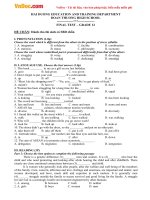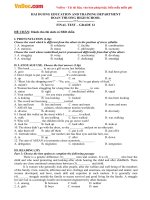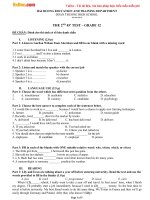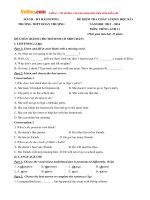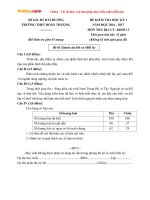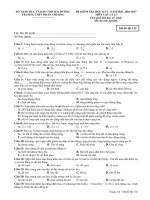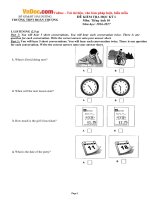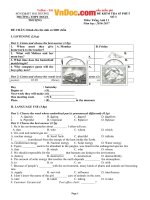- Trang chủ >>
- Đề thi >>
- Đề thi lớp 12
Đề thi học kỳ 1 môn tiếng Anh lớp 12 trường THPT Đoàn Thượng, Hải Dương năm học 2015 2016
Bạn đang xem bản rút gọn của tài liệu. Xem và tải ngay bản đầy đủ của tài liệu tại đây (134.62 KB, 8 trang )
SỞ GD – ĐT HẢI DƯƠNG
ĐỀ KIỂM TRA CHẤT LƯỢNG HỌC KÌ I
TRƯỜNG THPT ĐOÀN THƯỢNG
NĂM HỌC 2015– 2016 MÔN TIẾNG ANH 12
(Thời gian làm bài 45 phút)
ĐỀ CHẴN. Dành cho thí sinh mang số báo danh chẵn
I. LISTENING (2p)
Part 1: Listen and fill in the gaps:
I work for a market research (1)______________. We do research for companies that are
planning to develop new (2)______________. I (3)______________ people and ask them
questions about products they are using now. Sometimes I invite people to come to meetings.
I’ve been doing it for nearly (4)______________ years now, and I have no plans to change
jobs.
Part 2: Listen and choose the best answer:
People are talking about their part-time jobs. What do they like best about their jobs?
1. A. She works outdoor.
B. She meets interesting people.
C. She travels to South America
D. She can speak Chinese.
2. A. The salary is good.
B. He has flexible hours.
C. He has nice co-workers.
D. He can go out a lot.
3. A. It’s relaxing work.
B. He is well-paid.
C. He enjoys working with children
D. He works outdoors.
4. A. The hours are long.
B. Her co-workers are terrific.
C. She is well-paid
D. She has a free flat.
II. LANGUAGE USE (2,5p)
Part 1: Choose the word whose underlined part is pronounced differently (0,5p)
1. A. wanted
B. needed
C. acquainted
D. picked
2. A. influences
B. thoughts
C. lamps
D. photographs
Part 2: Choose the best answer (2,0)
1. The secretary _______ on the report for more than three hours. She hopes she will have
finished it by the lunch time.
A. works
B. has worked
C. worked
D. will work
2. The child's arm was swollen because he ______ by a bee.
A. stung
B. had stung
C. had been stung
D. had being stung
3. He is the man _______ car was stolen last week.
A. whom
B. who
C. which
D. whose
4. Mai is a ______ . She seldom feels sad or disappointed with her life.
A. pessimist
B. pessimistic C. optimistic
D. optimist
5. Many large ______ are wiped out in an economic depression.
A. buildings
B. departments
C. corporations
D. countries
6. What would you do if you ______ a wallet in the street ?
A. found
B. have been found
C. had found
D. Find
7. _______ Monday, Jim often goes to school by bus.
A. With
B. In
C. On
D. Of
8. John _______ away before his parents punished him.
A. went
B. is going
C. had gone
D. has gone
III. READING
Part 1: Choose the correct word for each of the blanks ( 1,0).
What do you do well? What do you enjoy doing? Your answers to these two questions
will help you identify your (1) _____. An employer will consider you seriously for a
(2)________ when you can show them that you know who you are, what you can offer and
which you have studied. Sometimes it is difficult to know what your weaknesses are. Clearly
not everyone is equally good (3) _________ everything. You may need to improve yourself
and so taking courses in that field could turn a weakness into strength.
You will need to (4) _____ some time on your self-assessment. Your honesty and the
desire for self-improvement will lead to success in getting the right job. Explore the following
seven areas to start to get to know yourself: your aptitude, your skills, your personality, the
level of responsibility you feel comfortable with, your interests and your needs.
1. A. strong
B. strength
C. strengthen
D. strengthened
2. A. position
B. location
C. spot
D. room
3. A. upon
B. in
C. at
D. for
4. A. use
B. make
C. lose
D. spend
Part 2 : Read the passage carefully and answer the following questions ( 2,0).
One of the most urgent environmental problems in the world today is the shortage of
clean water. Having clean drinking water is a basic human right. But acid rain, industrial
pollution and garbage have made many sources of water undrinkable. Lakes, reservoirs and
even entire seas have become vast pools of poison. Lake Baikal in Russia is one of the largest
lakes in the world. It contains a rich variety of animals and plants, including 1,300 rare
species that do not exist anywhere else in the world. But they are being destroyed by the
massive volumes of industrial wastes which pour into the lake every day. Even where law
existed, the government did not have the power to enforce them. Most industries simply
ignores the regulations. The Mediterranean Sea occupies 1% of the world’s water surface. But
it is the dumping ground for 50% of all marine pollution. Almost 16 countries regularly throw
industrial wastes a few miles off shore.
Water is free to everyone. A few years ago people thought that the supply of clean water
in the world was limitless. Today, many water supplies have been ruined by pollution and
sewage. Clean water is now scarce, and we are at last beginning to respect this precious
source. We should do something now.
1. What is one of the most urgent environmental problems in the world today ?
2. What has made many sources of water undrinkable ?
3. How many rare species that don’t exist anywhere else in the world are there in Lake
Baikal?
4. Should we do something to preserve clean water?
IV. WRITING( 2.5).
Part 1: Rewrite sentences without changing their meanings (1p)
1. If she isn't hard-working, she won’t get her degree. (Using Unless)
Unless she ____________________________________________________
2. In the future, I want to be a lawyer. A lawyer will give advice to people about the law and
speak for them in court. Using relative clauses
In the future ____________________________________________________
Part 2: (1.5p)
Your school’s English club is going to hold a writing competition on the following
topic: “What is your ideal world in the future?” In about 120 words, write about your ideal
world in the future.
- THE END-
ĐÁP ÁN ĐỀ THI HỌC KỲ 1 MÔN TIẾNG ANH LỚP 12 - ĐỀ CHẴN
I. LISTENING
PART 1
1. company
2. products
3. call
4. 15
PART 2
1. A
2. B
3. C
4. B
3. C
4. D
II. LANGUAGE USE
PART 1
1. D
2. A
PART 2
1. B
2. C
3. D
4. D
5. C
6. A
7. C
8. C
III. READING
PART 1
1. B
2. A
PART 2
1. One of the most urgent environmental problems in the world today /It is the shortage of
clean water
2.
Acid rain, industrial pollution and garbage (have made many sources of water
undrinkable).
3. 1,300.
4. Yes./ Yes, we should./ Yes, we should do something to preserve clean water.
IV.WRITING
1. Unless she is hard-working, she won’t get her degree
2. In the future, I want to be a lawyer who will give advice to people about the law and speak
for them in court.
SỞ GD – ĐT HẢI DƯƠNG
ĐỀ KIỂM TRA CHẤT LƯỢNG HỌC KÌ I
TRƯỜNG THPT ĐOÀN THƯỢNG
NĂM HỌC 2015– 2016 MÔN TIẾNG ANH 12
(Thời gian làm bài 45 phút)
ĐỀ LẺ. Dành cho thí sinh mang số báo danh lẻ
II. LANGUAGE USE:
Part 1: Choose the word whose underlined part is pronounced differently from the others;
1. A. watched
B. stopped
C. pushed
D. improved
2. A. works
B. plays
C. shifts
D. shops
Part 2: Choose the best option to complete the sentence:
1. An _______ depression is a time when there is little economic activity, which causes a
great deal of unemployment and poverty.
A. economic
B. economy
C. economical
D. economist
2. Many ___________of Islamic States (IS) were blamed for the series of attacks in Paris.
A. scientists
B. labour-saving devices
C. terrorists
D. domestic chores
3. This résumé _____________by my sister about a week ago.
A. write
B. wrote
C. is written
D. was written
4. In the future, cars _______run on petrol now will run on any fuels including biologic ones.
A. whom
B. whose
C. what
D. that
5. Before applying_________ a job, you should find out as much information about the job
and the employer as possible.
A. on
B. in
C. for
D. about
6. If I were you, I________the National University of Science.
A. will attend
B. had attended
C. would attend D. would have attended
7. We _______ as accountants since we left college three years ago.
A. worked
B. have worked
C. work
D. were working
8. During Mary’s job interview, while she _________ the last question, the interviewer asked
her to stop and offered her the job.
A. was answering
B. had answered
C. have answered
D. answered
III. READING:
Part 1: Choose the best answer to fill in the blank.
THE KOREAN EDUCATION SYSTEM
The Korean education system basically consists of primary schools, (1)______ schools,
high schools, and colleges or universities, with graduate courses leading to Ph.D.degrees.
Primary education is compulsory (2) ______ children aged from six to eleven. The basic
primary school curriculum is generally divided into eight subjects: the Korean language,
social studies, science, (3)______, ethics, physical education, music and fine arts. Students in
secondary schools are required to take a number of additional subjects, such as English, and
can take elective, such as technical or vocational courses. Afterwards, students can
(4)______between general education and vocational high schools. In general, high school
tends to be strict, as college and university admission is very competitive.
1. A. second
B. secondary
C. among
D. half
2. A. in
B. at
C. for
D. of
3. A. mathematician B. mathematics
C. mathematically
D. mathematical
4. A. divide
C. consist
D. choose
B. test
Part 2: Read the passage and answer the questions that follow (2.0 p)
A pilot cannot fly by sight alone. In many conditions, such as flying at night and
landing in dense fog, a pilot must use radar, an alternative way of navigating. Since human
eyes are not very good at determining speeds of approaching objects, radar can show a pilot
how fast nearby planes are moving. The basic principle of radar is exemplified by what
happens when one shouts in a cave. The echo of the sounds against the walls helps a person
determine the size of the cave. With radar, however, the waves are radio waves instead of
sound waves. Radio waves travel at the speed of light, about 300,000 kilometers in one
second. A radar set sends out a short burst of radio waves. Then it receives the echoes
produced when the waves bounce off objects. By determining the time it takes for the echoes
to return to the radar set, a trained technician can determine the distance between the radar set
and other objects. The word “radar”, in fact, gets its name from the term “radio detection and
ranging”. “Ranging” is the term for detection of the distance between an object and the radar
set. Besides being of critical importance to pilots, radar is essential for air traffic control,
tracking ships at sea, and for tracking weather systems and storms.
1. When must a pilot use radar?
2. What is the basic principle of radar?
3. How fast can a radio wave travel?
4. Is it true that radar can be applied in a number of fields like air traffic control, tracking
ships at sea or tracking weather systems and storms?
IV. WRITING
Part 1: Rewrite these sentences without changing the meanings
1. If we don’t stop destroying forests, there will be no forests left on the earth.
>>> Unless …………………………………………………………………………………….
2. They tell her about the film . It was shown on TV tonight.
>>> They ………………………………………………………………………………………
Part 2:
Your school’s English club has held a writing competition on the following topic
“What is your ideal world in the future?” In about 120 words, write about your ideal world
in the future.
ĐÁP ÁN ĐỀ THI HỌC KỲ 1 MÔN TIẾNG ANH LỚP 12 - ĐỀ LẺ
Part 1:
1.D
2. B
Part 2:
1. A
2. C
3. D
4. C
5. C
6. C
7. B
8. A
III. READING
Part 1:
1. B
2. C
3. B
4. D
Part 2:
1. In many conditions, such as flying at night and landing in dense fog, a pilot must use radar,
2. The basic principle of radar is exemplified by what happens when one shouts in a cave.
3. about 300,000 kilometers in one second.
4. Yes, it is.
IV. WRITING
Part 1:
1. Unless we stop destroying forests, there will be no forests left on the earth.
2. They tell her about the film which is shown on TV tonight.
Part 2:


